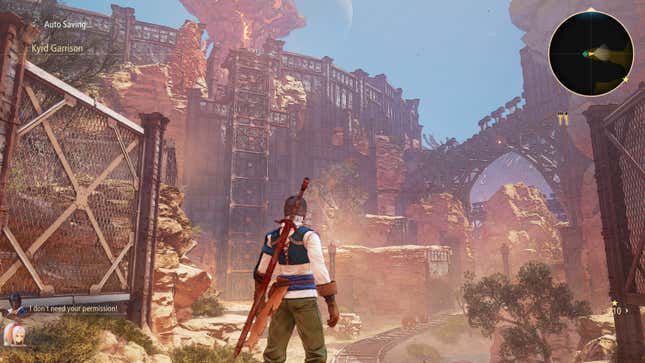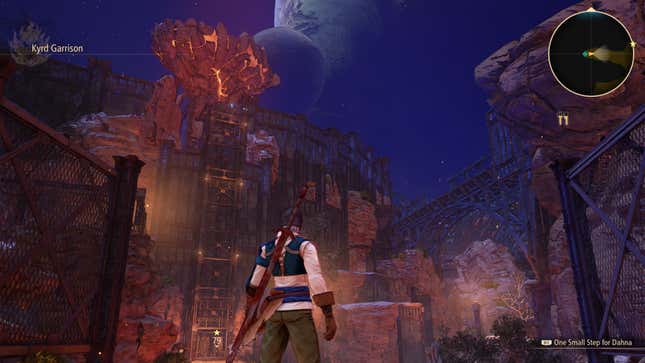
A man wearing an iron mask who doesn’t remember his past. A woman who electrocutes people and has a magic rock hidden in her chest. A rag-tag band of rebels trying to overthrow an empire. The start of Tales of Arise is ridiculous, and also the most fun I’ve had with a JRPG in years.
There are a few reasons for this.
One is that Arise is a very, very pretty game—much prettier than I would expect a budget release made in Unreal Engine to look. It looks the way my brain remembers PS2 JRPGs looking: like a cel-shaded anime you can walk around in.


Arise is not cel-shaded, but it does have some crisp lines that really play up the vibrant colors and environmental details bringing its sci-fi fantasy world to life. Bandai Namco Studios may have been working off a tight budget, but nothing about Arise feels cookie-cutter off the UE assembly line.
Another reason is that its real-time action combat is simple but endlessly satisfying. There’s a hint of complexity in how you chain abilities together, but mostly it just feels very good to jump, roll, and pull off cool, weighty combos with just a few button presses. You know something good is going on when you run past the same generic, dinosaur-lookin’ monster a dozen times and can’t help yourself from diving back into battle for a few more experience points every time.
But the biggest reason Arise won me over so quickly is the way it throws you right into its messy story without getting bogged down in a bunch of details or side-tracked by endless character banter. It starts in a dry wasteland called Calaglia, ruled over by Lord Balseph, a regional manager for a technologically advanced empire. You play as Dahnan, a slave who can’t remember why his head is locked in an iron helmet.
The game lays out the stakes of the struggle, then immediately gets into the action. A group of rebels called the Crimson Crows tries to hijack an imperial convoy. Inside they find a woman named Shionne who inadvertently electrocutes anyone she touches. She happens to be a member of the empire, but is clearly not on its side. Also, she has a gem called the Master Core hidden in her chest, from which Dahnam can pull out a sword of fire and proceed to wreck enemy soldiers. Revolution and intrigue ensue.

Kotaku’s Ari Notis explained it perfectly in his review when he described Arise’s story as “a deliciously cascading mystery, one that answers each question by raising two more that are far more intriguing than the first.” The writing is nothing fantastic, and I’m not emotionally attached to any of the characters, but I am interested to see where their fight for liberation goes. Interested enough, at least, to propel me through an otherwise familiar but enjoyably breezy formula of grinding battles, completing side-quests, and leveling up for bosses.
I get the sense that Arise’s heroes don’t know as much about their world and struggle as they think they do. How did the empire come to rule in the first place? What’s the long game behind its cruelty and exploitation? Why did the one person seemingly able to bring it all crashing down lose his memory? The conflict is at once easy to grasp—the downtrodden rise up—but hard to predict, which is just enough to make me want to get from one loading screen to the next.

Opening your 50-hour-long JRPG epic with a modicum of relatability and suspense sounds obvious, but there are plenty of games that don’t do it. I’ve struggled with a few previous Tales games for this very reason. I love Dragon Quest XI for what it is, but it’s a snoozefest. Even Final Fantasy XV doesn’t get going until the last third. Octopath Traveler and Bravely Default II have great turn-based combat, but everything else is as stale as a centuries-old fairy tale. That doesn’t make those games bad, but it did stop them from immersing me from the jump the way some of the classics that inspired them did.
Xenogears comes to mind, not just because it also has an early desert section and revolves around one civilization enslaving another, but because it too gets a lot of mileage out of simple mysteries early on. I doubt Arise will turn out to be as surprising or impactful for me as Square Enix’s biblical mech game was, but it’s made me excited to find out.
Where so many other recent games of its ilk have let me down, even when I was able to appreciate them on the whole for what they were, Tales of Arise has hooked me and won’t let go. I hope it never does.




